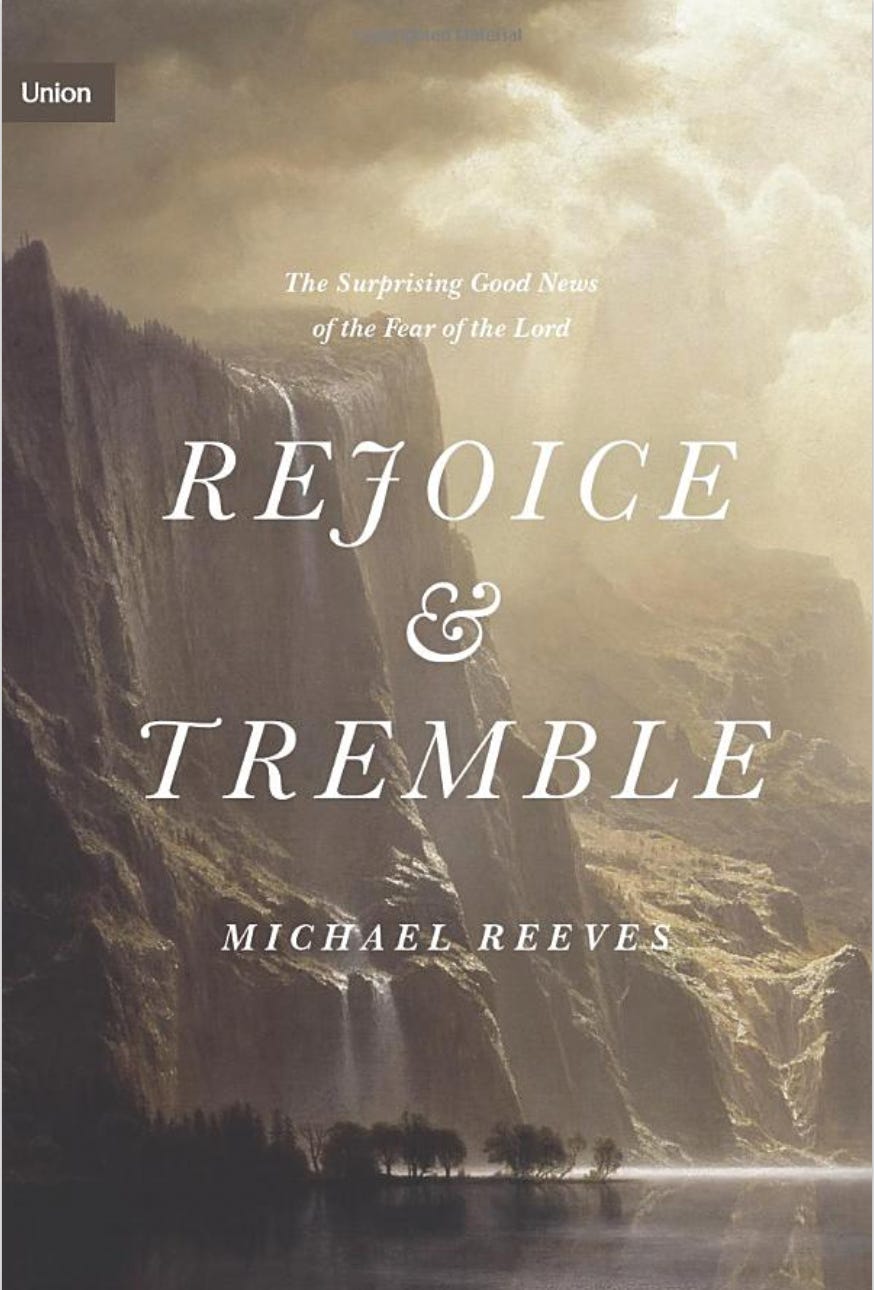Closing the Book(s) on 2022
The delights of fear, the ills of illiberals, and the buttress of creation
Dear friends and supporters:
It’s encouraging to see so many year-end lists of books read by friends and acquaintances, and I hope beneficially to add to that trend in this article. I should mention two 2022 book reviews published here in CultureChange, both, coincidentally, from British colleagues: Dr. Joseph Boot’s Ruler of Kings and Stephen Perks’ Disciple the Nations.
As a half-century self-confessed bibliophile, I’ve read so many books that I must be selective about the titles I read in my remaining time on earth. I try to limit my reading to books that (a) legitimately challenge my present assumptions and/or those (b) likely to enhance my knowledge in deficient areas.
Here I’ll simply elaborate on three intriguing titles I read last year.
The Delights of Fear
My colleague Brian G Mattson introduced me to the works of Michael Reeves, and I’ve read his books on the Trinity, on Jesus Christ, and on prayer, all of which I’ve enjoyed and benefited from. This fall I read his Rejoice and Tremble, a fascinating work explaining the fear of God in ways one almost never encounters. At the heart of all of his books is the theme of rejoicing and delighting in God and his works, and one gets the impression Reeves genuinely relishes everything about being a Christian — following Jesus is the best fun in the world.
Reeves knows that “Do not fear” and derivative imperatives are the most frequent commands in the Bible, and thus on the surface they might be hard to square with the frequent command to fear God. He obviously makes a distinction between different kinds of fear. He observes that we moderns are physically safer, and yet more fearful than ever before, thereby proving that physical safety is not incompatible with fearful living. Rather, he suggests that the fear of the Lord reins in our anxiety, while “anxiety grows best in the soil of unbelief.“ He notes that there’s less anxiety in a Christian culture than in secular culture.
Reeves recognizes the reality of sinful fear, of course, and he intriguingly writes that this version of fear is “a struggle against joy.” He declares that “we fear because we love: we love ourselves, and so fear bad things happening to us; we love our families, our friends, our things, and so fear losing them.” Our fears grow out of our love, so if we love wrongly, or wrong objects, we will fear wrongly.
Obviously there’s godly, legitimate fear, and God himself is called “The Fear” (Genesis 31:42, 53). Most of the time this doesn’t precisely connote trepidation or even reverence, but rather more a trembling of pleasure at God’s awesome goodness. “Fear,” Reeves insists, “is the very emotional extremity of wonder.” A new husband quakes in delighted fear at the wonder-inducing love for his new wife.
Therefore, the terms respect and reverence are too weak to describe this fear of the Lord. In fact, says Reeves, “this trembling ‘fear of God’ is a way of speaking about the sheer intensity of the saints’ happiness in God,” and the fact that Jesus Christ himself fears God (Isaiah 11:1–3) proves that the fear of the Lord is not limited to fallen humanity.
Reeves contrasts the fear of the Lord as an internal disposition that bears outward fruit in our lives with the views of Aristotle and Aquinas, for whom change in humanity moves from the outward to the inward. If the fear of the Lord is the beginning of wisdom, we should understand that forming correct habits, necessary though they are, should be the result, not the cause, of the fear of the Lord. The gospel itself inculcates valid, godly fear, working its way from inside out.
Fear is a nearly infallible indicator of our spiritual state: “What you fear shows what you really love,” Reeves writes. Moreover, the fear of the Lord propels sanctification: “The fear of the Lord … consumes sinful desires, and fuels holy ones.” “Therefore, as the fear of the Lord grows it destroys all rival fears.”
These and similar truths reveal both a mind and heart profoundly attentive to the Word of God, and this biblical theology, nourished in heartfelt devotion, is all too rare.
The Ills of Illiberals
One of the most unanticipated political developments of the late 20th and early 21st centuries has been the dramatic change within both the American Left and Right. Previously both were committed to the philosophy of the American Founding, known as classical liberalism, with some deviations. For much of the 20th century, the Left was committed to religious liberty, free speech, checks and balances and so on, just as the Right was. The difference was that early in the 20th century the Left gave in to interventionist economics — Socialism-Lite. This combination became modern (in contrast to classical) liberalism.
The Right was opposed (at least in principle) to this economic interventionism and more fully perpetuated the older classically liberal ideal.
Today, the Left has been subverted by Cultural Marxism and the newest New Left, while the Right has been commandeered by Fascism-Lite. Both embrace illiberalism, anti-liberalism in fact, where liberalism means maximum individual freedom bounded by God’s moral law.
Stephen Holmes’ book traces the genealogy of this illiberalism. In part one he deals with early anti-liberal figures like the Counter-Enlightenment Roman Catholic monarchist Joseph de Maistre, the Nazi court philosopher Carl Schmidt, and the American epistemic postmodernist darling Alasdair McIntyre.
Despite their differences, these illiberals (anti-liberals, whose children today wish to be known as “post-liberals”) all shared disdain for the Protestant free society. Prototypical anti-liberals like Plato and Aristotle positioned the individual as significant only within a community (which frankly is what almost all ancient societies believed), and usually this meant the political community, and today the nation-state (nationalism). The free society allegedly leads to “atomization,” individuals becoming alienated from their “true selves” as Marx taught, though Holmes does not address Marx in this particular book. The illiberals always require a larger purpose for man, the “common good.” Because this common good is almost never voluntarily embraced, it must be coercively imposed. In other words, anti-liberalism by its very nature demands statism.
Anti-liberals tend to oppose political checks and balances like constitutions, legislatures, and overlapping jurisdictions because these stand in the way of a unified muscular national purpose, which often can best be championed by a dispositionally and physically muscular individual leader (see: Vladimir Putin) . Dictatorship is fine, as long as it’s a benevolent dictatorship, securing the common good, benevolent being defined (of course) by the illiberals.
In addition, anti-liberals tend to deplore economic freedom precisely because it enhances individual freedom. That’s why illiberals deride the assertedly cold and impersonal “commercial society.” Yet the classical liberals weren’t particularly fond of businessman. Rather, they believed free commerce was a strong deterrent to centralized political power, or tyranny. Widely dispersed property protects against dictators. Economic liberty isn’t an end in itself.
Anti-liberals, in addition, criticize classical liberals for being moral skeptics, opposing the idea of a strong, unified national good. This is a false accusation. Classical liberals believe in strong moral absolutes, many of them affirming God’s moral law bounding society; but all of them believe that there are universal rules for society that apply equally to all. This is a far cry from moral skepticism.
Homes observes that anti-liberalism today comes in two flavors: anti-individualistic illiberalism of paleoconservatism, and hyper-individualistic illiberalism of modern Leftism. Both are enemies of the free society whose most obvious historical example has been the United States.
I have found few books timelier for the present sociopolitical climate.
The Buttress of Creation
Colin Gunton, a British Reformed systematic theologian who died prematurely, specialized in Trinitarianism and Christology. Unlike most 20th century Reformed theologians, he had a robust appreciation of creation. He never finished a systematic theology, but his book The Christian Faith is the closest thing to it. Its arrangement is Trinitarian: the Father in creation, the Son in redemption, and the Spirit in perfection. The book bristles with sharp ideas, but the following were particularly impressive to me.
First, there’s a crisis in our world today because of the loss of confidence in the foundation of creation. We rightly understand that theology collapses when we lose confidence in the Bible, but it’s equally true to say that the loss of the doctrine of creation precipitated that collapse. In fact, it’s likely correct to assume the loss of the truth of creation preceded the loss of confidence in the Bible. You can’t get creation wrong and get theology — or anything else — right. Creation buttresses everything else.
In his chapter on Christ’s incarnation, Gunton suggests Jesus’ healing and exorcism ministry was the wrath of God in action against Satan’s destructive usurpatory reign. In contrast, we often interpret that ministry as God’s liberating kindness to those enslaved by Satan. Yet these dramatic actions by our Lord are much broader than that. Satan’s kingdom enslaves, debases, and dehumanizes, and Christ’s deliverance is actually his wrath again Satan‘s kingdom. You might’ve noticed reading the gospels how angry the Lord seems at times when healing illness and casting out demons. He is angry at Satan and Satan’s enslavement of humanity.
Addressing the Christian life, Gunton declares that “justification is liberation from the need to make and remake ourselves.” Our postmodern world is one of endless reinventions — we continually reinvent ourselves, and even reinvent reality. This seems to be the summit of radical individual autonomy, but it is an existential burden none of us was meant to bear. We’re created in God’s image, and we simply can’t remake ourselves.
When we’re declared righteous on the basis of Christ’s atoning death and bodily resurrection (that is, justified), Adam’s originally sinless created status is in principle restored and even enhanced. It’s not necessary for us constantly to be on a grand quest for reinvention, new identity. We can be content to accept ourselves as the summit of created reality, shaped in God’s image. This is a glorious benefit of the doctrine of justification not often perceived.
This book consists of scores of such theoretical and practical insights.
Personal
Sharon and I are were so delighted with the annual visit of our oldest son Richard (his dear wife Sam wasn’t able to make this trip). He’s a conservative Anglican church leader, PhD grad in philosophy from the University of British Columbia, and a philosophy instructor at Corpus Christi College.
More importantly, he is a faithful man of God.
I’m running up against my word limit, so l’ll give a longer update next time.
Yours and His,
Founder & President, Center for Cultural Leadership
Tweet of the week
More great stuff:
The Center for Cultural Leadership site is here.
My Amazon author page (print and digital) is here.
My I-Tunes sermons, lectures and podcasts are here.
You can find my sermons and lectures at my YouTube channel.
Sign up to get my blog updates here.
Here’s my Twitter feed.
If you want to get the free exclusive hard copy publication Christian Culture, please send me a Facebook private message.
The CCL phone number is 831-420-7230.
The mailing address is:
Center for Cultural Leadership
P. O. Box 100
Coulterville, CA 95311










Thank you for the book discoveries.